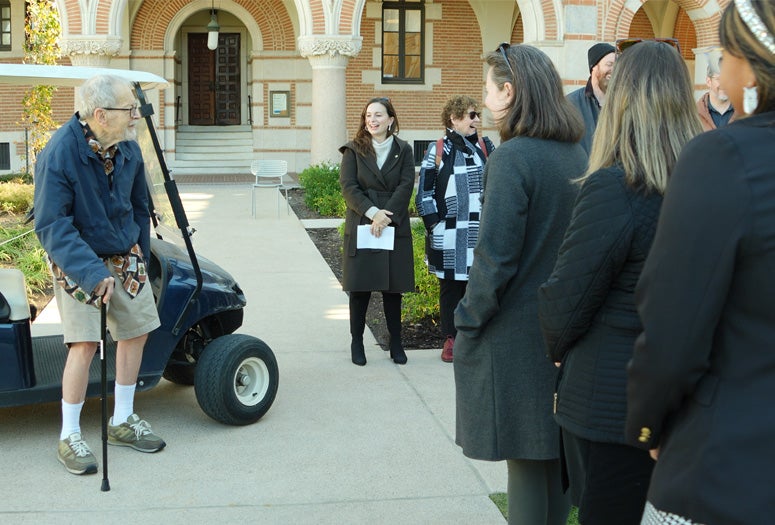Russell “Russ” Pitman ’58 visited Rice University’s new Academic Quadrangle Dec. 11, marking a significant moment in the institution’s history. Pitman, who graduated from the then-Rice Institute in 1958, is celebrated as one of the university’s most generous supporters, having established more than 75 endowed funds that span nearly every aspect of campus life.
“We came together today to celebrate Mr. Russ Pitman, who is just as much of an institution as the institution is,” said university historian Portia Hopkins. “We were able to bring people from all different walks of life and different corners of our campus together to show him the quad and to celebrate all of his contributions and all of the ways that he has made Rice a better place for all of us.”
Along with Hopkins, the crowd celebrating Pitman included university associate Paula Gilmer DesRoches; Stephen Bayer, vice president for development and alumni relations; Kathleen Canning, dean of humanities; Rachel Kimbro, dean of social sciences; Igor Marjanovic, dean of architecture; Nate Citino, chair and professor of history; Emily Stein, senior director of development for humanities; Pippa Jarvis, Shepherd School of Music donor relations officer; and Mary Lowery, executive director of Friends of Fondren Library.
“As a retired staff member, Russ understands that administrative work often flies under the radar, though it’s administrative work that is the university’s engine,” said Stein. “By naming endowments for staff members, he’s making visible the people who are generally less seen.”
Pitman’s connection to Rice runs deep. After earning his bachelor’s degree in economics and business administration, he joined the university staff in 1960 as chief accountant. Over the next two decades, he held several key roles including assistant to then-President Norman Hackerman and manager of business affairs before retiring in 1980. In the years since, his philanthropy has shaped the university’s landscape, supporting initiatives in architecture, music, art, scholarships and more. Notably, the Pitman Oculus, a striking feature of the Moody Center for the Arts, and the Humanities Building’s Pitman Tower bear his name.
As a collector of fine art, Pitman took particular interest in the bronze statue of Rice founder William Marsh Rice during his visit.
“He has this really crisp eye,’” Hopkins said. “And he loves bronze. When he was like, ‘That’s a good piece of bronze,’ I was like, ‘Oh, he’s so excited.’”
Pitman’s approach to philanthropy reflects his deep commitment to Rice and its community. Using creative financial tools like charitable gift annuities and bequests, he has ensured lasting support for the university’s endeavors. His endowments fund scholarships, research trips and student awards, including initiatives in the School of Architecture, where two recent funds were announced to support 14 student research trips worldwide.
“He continues to give and recognizes that through his giving he’s providing opportunities for other people who otherwise might not have had those opportunities,” Hopkins said. “He doesn’t like us to make a fuss over him, but how can I not fuss over all the things that you’ve done? He’s just so generous, and he’s generous in a way that does not require a lot of performance.”
Pitman’s impact goes beyond his financial contributions. He is a beloved figure known for his quick wit and deep appreciation of Rice’s history and culture.
“As a historian, I think about all of the things that he was able to live through and is continuing to live through with Rice history,” Hopkins said. “He really is just an amazing person.”
Hopkins encapsulated the sentiment of the day with heartfelt words of gratitude.
“We often talk about philanthropic giving, and we talk about how there are good people in the world,” Hopkins said. “Then you meet Russ, and you’re like, ‘Oh, you’re the people that they’re talking about. You’re the good people.’”
For a man who once described Rice as his “family and second home,” the day was a celebration of both legacy and belonging.
“Being committed to Rice means that we’re family, and being family means that we look out for each other,” Hopkins said. “We take care of each other, and we recognize that this thing cannot happen in a vacuum.”

